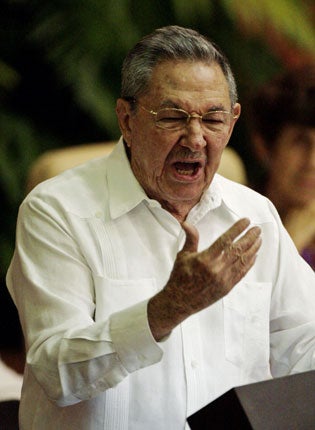Castro vows reforms 'without pause' for Cuba

Your support helps us to tell the story
From reproductive rights to climate change to Big Tech, The Independent is on the ground when the story is developing. Whether it's investigating the financials of Elon Musk's pro-Trump PAC or producing our latest documentary, 'The A Word', which shines a light on the American women fighting for reproductive rights, we know how important it is to parse out the facts from the messaging.
At such a critical moment in US history, we need reporters on the ground. Your donation allows us to keep sending journalists to speak to both sides of the story.
The Independent is trusted by Americans across the entire political spectrum. And unlike many other quality news outlets, we choose not to lock Americans out of our reporting and analysis with paywalls. We believe quality journalism should be available to everyone, paid for by those who can afford it.
Your support makes all the difference.Cubans who long ago lost faith that their country will change may reconsider after the first Communist Party Congress in 14 years opened in Havana on Saturday with a scolding from Raul Castro that the sclerotic habits of a geriatric government and a centrally planned economy must end.
Before it wraps up tomorrow, the Congress is expected to bring new faces into the top positions of the regime and approve a set of risky reforms first outlined last year to nudge Cuba towards a mixed economy with new measures to allow private enterprise and fewer state employees. Mr Castro's difficult mission: to save the Communist revolution of his brother, Fidel.
As if to underline his sincerity, Mr Castro, who replaced an ailing Fidel as Cuba's leader in 2007, startled many by proposing a system of term limits under which no one – including him – could serve in top positions for more than two successive five-year terms.
The term-limit proposal implies that Cuba is approaching a time when a Castro will not be at the helm. Yet some of the messages remained mixed. The Congress opened on a nostalgic note with a traditional Soviet-style military parade celebrating the 50th anniversary of the failed Bay of Pigs invasion of 1961, when Cuban exiles backed by the CIA attempted to invade.
Mr Castro will be battling against bureaucratic inertia. His timetable for removing 1.1 million Cubans from the state payroll has already been extended and he admitted the process might take five years: the changes will come "without hurry but without a pause".
Other steps likely to be rubber-stamped this week include a new push to issue licences to ordinary Cubans for opening private enterprises, a shift that will be more necessary as state jobs are taken away. About 200,000 of those licences have already been given out, Mr Castro said. He is also intent on increasing the leasing of state land to farmers in an attempt to boost dismal agricultural output.
The promise of change may give Cubans hope, but it also may unnerve them. The reforms will include phasing out the ration books that most people have used for decades to buy groceries.
Mr Castro said the state had to learn to live within its means: "Two plus two is four. Never five, much less six or seven, as we have sometimes pretended."
He also struck other unexpected notes, chastising the regime built by his own brother for agreeing to reforms in the past and failing to enact them. He even looked to Cuba's journalists in the hall and said their coverage of Cuban politics had become superficial. They must do better and officials must be more open to them, Mr Castro said. That Mr Castro and the top ranks of the Communist Party are still struggling to see how far towards a mixed economy they can move without compromising the revolution remains clear. He spoke of giving Cubans the right to sell cars and homes but ruled out broader ownership of property. Capitalism will be rejected yet "the force of the market will not be ignored", he said.
Ending the distribution of rations may be the most difficult reform to enact. But Mr Castro highlighted that as vital if Cuba's economy is to survive. The ration tickets had become "an unsupportable burden for the economy and a disincentive to work", he said.
Mr Castro, who turns 80 this month, also said the state does not have "a reserve of well-trained replacements with sufficient experience and maturity" to replace the current leaders, nearly all of whom are now in their 70s and 80s. The time had come he said to instigate "systematic rejuvenation of the whole chain of party and administrative posts", he said.
Join our commenting forum
Join thought-provoking conversations, follow other Independent readers and see their replies
Comments